| Listing 1 - 10 of 121 | << page >> |
Sort by
|
Book
ISBN: 0128170875 0128170867 9780128170878 9780128170861 Year: 2020 Publisher: Amsterdam, Netherlands : Elsevier,
Abstract | Keywords | Export | Availability | Bookmark
 Loading...
Loading...Choose an application
- Reference Manager
- EndNote
- RefWorks (Direct export to RefWorks)
Book
ISBN: 0128178825 0128178833 9780128178836 9780128178829 Year: 2021 Publisher: London : Academic Press, an imprint of Elsevier,
Abstract | Keywords | Export | Availability | Bookmark
 Loading...
Loading...Choose an application
- Reference Manager
- EndNote
- RefWorks (Direct export to RefWorks)
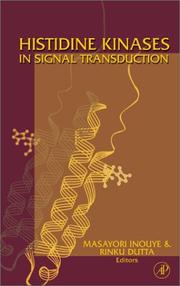
ISBN: 128105691X 9786611056919 0080534015 0123724848 Year: 2003 Publisher: Boston ; Amsterdam : Academic,
Abstract | Keywords | Export | Availability | Bookmark
 Loading...
Loading...Choose an application
- Reference Manager
- EndNote
- RefWorks (Direct export to RefWorks)
Living cells are constantly sensing environmental changes, and their abilities to sense these changes and adapt to them are essential for their survival. In bacteria, histidine kinases are the major sensors for these environmental stresses, enabling cells to adapt to new growth conditions. Written by leading experts in the field, this book provides an up-to-date and comprehensive review on the structure and function of histidine kinases. It also provides extensive information on the physiological roles of histidine kinases in bacteria and eukaryotes. An an essential reference f
Protein kinases. --- Cellular signal transduction. --- Cellular information transduction --- Information transduction, Cellular --- Signal transduction, Cellular --- Bioenergetics --- Cellular control mechanisms --- Information theory in biology --- Protein kinase --- Protein phosphotransferases --- Phosphotransferases
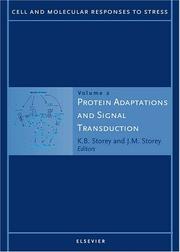
ISBN: 128104850X 9786611048501 0080539963 0444507590 9780444507594 9780080539966 9781281048509 Year: 2001 Publisher: Amsterdam New York Elsevier
Abstract | Keywords | Export | Availability | Bookmark
 Loading...
Loading...Choose an application
- Reference Manager
- EndNote
- RefWorks (Direct export to RefWorks)
This volume of Cell and Molecular Responses to Stress has two broad themes: an examination of selected protein adaptations that support stress tolerance and an analysis of signal transduction systems, those critical links between the perception of stress and the activation of the coordinated metabolic responses that ensure survival. Several chapters deal with adaptive responses to environmental cold temperature and highlight novel advances in mammalian hibernation, low temperature enzyme function, cold-shock and antifreeze proteins, and freezing survival. Other chapters stretch out to
Proteins. --- Cellular signal transduction. --- Cellular information transduction --- Information transduction, Cellular --- Signal transduction, Cellular --- Bioenergetics --- Cellular control mechanisms --- Information theory in biology --- Proteids --- Biomolecules --- Polypeptides --- Proteomics
Book
ISBN: 0128194049 9780128194058 0128194057 9780128194041 Year: 2020 Publisher: London, England : Academic Press,
Abstract | Keywords | Export | Availability | Bookmark
 Loading...
Loading...Choose an application
- Reference Manager
- EndNote
- RefWorks (Direct export to RefWorks)
Book
ISBN: 1628080000 9781628080001 1626189927 9781626189928 Year: 2013 Publisher: New York
Abstract | Keywords | Export | Availability | Bookmark
 Loading...
Loading...Choose an application
- Reference Manager
- EndNote
- RefWorks (Direct export to RefWorks)
Labyrinth (Ear) --- Cellular signal transduction. --- Cellular information transduction --- Information transduction, Cellular --- Signal transduction, Cellular --- Bioenergetics --- Cellular control mechanisms --- Information theory in biology --- Inner ear --- Internal ear --- Ear --- Hearing
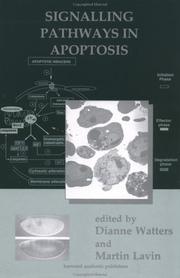
ISBN: 0429176910 148229821X 1280071710 9786610071715 0203303652 9780203303658 9789057023927 905702392X 905702392X 9781482298215 9781280071713 6610071713 9780429176913 9781040214046 1040214045 Year: 1999 Publisher: Amsterdam : Harwood Academic,
Abstract | Keywords | Export | Availability | Bookmark
 Loading...
Loading...Choose an application
- Reference Manager
- EndNote
- RefWorks (Direct export to RefWorks)
Apoptosis, or programmed cell death, is a necessary process by which a cell may die without adversely affecting its environment. It plays a crucial role in normal development, and in the body's defence mechanisms against disease. Too much cell death is destructive, leading to neurodegenerative diseases and impaired development. Conversely, too little cell death can lead to an increased susceptibility to cancer and sustained viral infection. Apoptosis is a matter of balanceDramatic progress has been made in the study of apoptosis over the past decade. One of the most rapidly expanding knowl
Book
ISBN: 1536136255 9781536136258 Year: 2018 Publisher: New York Nova Science Publishers, Incorporated
Abstract | Keywords | Export | Availability | Bookmark
 Loading...
Loading...Choose an application
- Reference Manager
- EndNote
- RefWorks (Direct export to RefWorks)
Lipids --- Cellular signal transduction. --- Cellular information transduction --- Information transduction, Cellular --- Signal transduction, Cellular --- Bioenergetics --- Cellular control mechanisms --- Information theory in biology --- Lipides --- Lipins --- Lipoids --- Biomolecules --- Steroids --- Physiological effect.
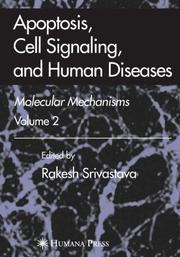
ISBN: 1280832606 9786610832606 1597452009 1588296776 Year: 2007 Publisher: Totowa, N.J. : Humana Press,
Abstract | Keywords | Export | Availability | Bookmark
 Loading...
Loading...Choose an application
- Reference Manager
- EndNote
- RefWorks (Direct export to RefWorks)
Apoptosis, Cell Signaling, and Human Diseases: Molecular Mechanisms, Volumes 1 and 2, present a concise synthesis of recent developments in the understanding of both cell survival and apoptotic pathways. Particular attention is given to apoptosis in human diseases, such as different forms of cancer and neurodegenerative diseases. These comprehensive volumes integrate the most innovative and current findings from several related disciplines of scientific research, including pathology, genetics, virology, cell biology, immunology, and molecular biology. Volume 1 is divided into two sections: “Malignant Transformation and Metastasis” and “Molecular Basis of Disease Therapy.” Volume 2 follows a similar structure and is divided into sections entitled “Kinases and Phosphate” and “Molecular Basis of Cell Death.” All of the contributors are at the forefront of scientific discovery, and the reviews they present systemically examine the most exciting and innovative aspects of their particular areas of expertise. Researchers will find these volumes of major benefit as they search for novel and more effective treatments for human diseases.
Apoptosis. --- Pathology, Molecular. --- Cellular signal transduction. --- Cellular information transduction --- Information transduction, Cellular --- Signal transduction, Cellular --- Bioenergetics --- Cellular control mechanisms --- Information theory in biology --- Molecular pathology --- Molecular biology --- Physiology, Pathological --- Cell death
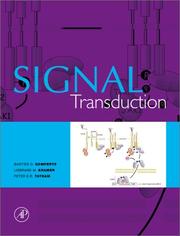
ISBN: 0122896319 0122896327 9780080541181 0080541186 9780122896323 1281070629 9786611070625 9780122896316 9781281070623 Year: 2002 Publisher: San Diego, Calif. : Academic Press,
Abstract | Keywords | Export | Availability | Bookmark
 Loading...
Loading...Choose an application
- Reference Manager
- EndNote
- RefWorks (Direct export to RefWorks)
Signal Transduction is a well-illustrated, coherent look at cellular signaling processes. Beginning with the basics, it explains how cells respond to external cues, hormones, growth factors, cytokines, cell surfaces, etc., and then shows how these inputs are integrated and coordinated. The extensive color artwork provides the reader with a clearer comprehension of key topics, and margin notes are incorporated to highlight milestones in the evolution of signal transduction. This book serves as an invaluable resource for advanced undergraduates, graduate researchers, and established scien
Human physiology --- fysiologie --- moleculaire biologie --- Cellular signal transduction. --- Transduction du signal cellulaire --- ELSEVIER-B EPUB-LIV-FT --- Cellular signal transduction --- Cellular information transduction --- Information transduction, Cellular --- Signal transduction, Cellular --- Bioenergetics --- Cellular control mechanisms --- Information theory in biology --- SIGNALS --- MONOGRAPHS --- TRANSDUCTION
| Listing 1 - 10 of 121 | << page >> |
Sort by
|

 Search
Search Feedback
Feedback About UniCat
About UniCat  Help
Help News
News